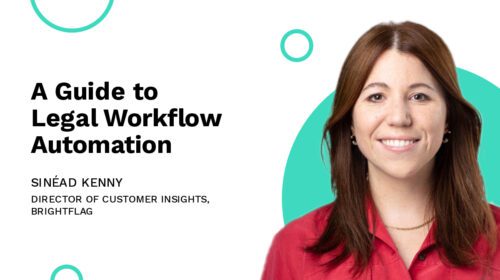4 Ways to Use AI to Reduce Legal Spend
When ChatGPT launched in November 2022, it created a whirlwind of hype. In its aftermath, it seems like every product in the legal industry launched functionality powered by artificial intelligence, but it can be hard to understand if these new tools actually provide value or if they are just shiny objects.
Legal spend management is an area where AI has been delivering solid results for a decade. Brightflag released our AI invoice review and spend analytics ten years ago and has been leveraging AI technology to help companies reduce legal costs ever since.
From saving attorney time to streamlining invoice review, in-house teams continue to use AI-powered tools to reduce legal spend. Here are four ways AI is revolutionizing legal spend management.
1. Automated Application of Outside Counsel Guidelines
With a system that automatically applies your outside counsel guidelines to your invoices, you can be confident every invoice gets a consistent review and that you only pay for work that delivers value.
Leveraging AI to interpret the natural language in invoice line items, the system uses your outside counsel guidelines to check each invoice as it is submitted. It’s able to flag any issues that don’t align with them or billing best practices. It acts as your first reviewer, making sure the invoice matches the guidelines and approved rates.
If you don’t have a set of outside counsel guidelines in place, you can use Brightflag’s best practice guidelines and tweak them over time to fit your organization.
The Problem It Solves in Legal Spend Management
Attorneys typically aren’t well-versed in the details of your outside counsel guidelines, so application can be inconsistent depending on who is doing the review. Your busy attorneys simply don’t have time to review invoices line by line. Their limited time is better spent on impactful legal work instead of this routine task.
Also, the attorneys want to keep good relationships with their outside counsel. When an invoice doesn’t align with the guidelines, it can lead to an uncomfortable conversation with the firm.
How It Reduces Costs and Improves Efficiency
The system acts as a first line of defense, making sure every invoice gets a thorough review based on your complete set of guidelines — not just what the attorney doing the review is most familiar with. It’s more likely to flag discrepancies consistently so they can be adjusted from the invoice.
Even if you don’t reject the invoice based on the flags, simply letting your firms know you are watching creates a Sentinel Effect. Knowing you are tracking can prompt firms to improve their billing hygiene.
If a firm wants to know more about the flagged line items, they can can download a report with explanations directly from the e-billing system. All of these tools streamline administrative tasks so your attorneys can focus on more high-value work.
SMBC saved $2.7 million from the automatic application of outside counsel guidelines and discounts. According to Kimberly Williams, the Head of Legal Operations at SMBC, “The automation within the system can remove what can be a stressful dynamic with their firm. Attorneys don’t want to argue with their firms about bills.” When there is a rejection, it comes from the system, not the individual attorney, which makes the conversation easier.
Future Developments and Potential Impact
Brightflag’s Invoice Summaries feature uses generative AI to deliver a summary of the work performed on each invoice, as well as any outside counsel guideline violations, directly to an attorney’s email inbox. Straightforward invoices can be approved right from the email, while more complex invoices can be reviewed in Brightflag.
2. Reduce Attorney Time Spent on Invoice Review
As Cece Cornett, Customer Success Manager at Brightflag, mentioned in the webinar Effective Invoice Review in 2024, “No one goes to law school dreaming of reviewing invoices.” The use of AI-powered tools can take much of the frustration out of invoice review and help your firms get paid faster.
When your outside counsel guidelines are loaded into your legal technology, each invoice is automatically reviewed line by line, flagging any issues. You can automatically reject invoices based on clear deviations from your guidelines or because of a bill-to error that would cause finance to reject them.
The system can automatically approve invoices, especially smaller ones for dollar amounts with no outside counsel guideline breaches. It can also summarize pending invoices in an email, making it easy to review and approve an invoice directly from the email.
The Problem It Solves in Legal Spend Management
Without a system that does invoice review, the workflow can be manual and time-consuming — invoices can often have hundreds of line items for your attorneys to review. Also, when you don’t have an e-billing system in place, invoices don’t always get routed to the correct reviewer.
Even when they do get routed correctly, small-dollar value invoices can take several minutes to review, while more complex invoices can take upwards of half an hour. There can be a lot of people- and paper-chasing to get an invoice through a traditional review process, which can slow down payment and frustrate your vendors.
“For so many people, AI does the worst part of outside counsel work, which is invoice review and making sure your guidelines align,” said Mark Allen, Director of Legal Operations and Strategy at Zillow, during a webinar.
How It Reduces Costs and Improves Efficiency
The system automatically flags issues for the reviewer, making it much faster to decide if it should be approved or rejected. By incorporating the automatic rejection feature, any invoices that meet certain criteria will be sent back to the outside counsel. So, invoices that make it to a reviewer are more likely to be correct or at least have fewer flags to review. If you use the automatic approval process, it decreases the number of invoices that need to be reviewed by as much as 30%.
One Brightflag customer turned on the flag to track time recorded in excess of 10 hours per day. The system flagged an invoice that was billing 18 hours for reviewing documents. It was clearly a typo — the firm meant 1.8 hours. The invoice was amended and resubmitted. That catch saved almost $24,000, as well as an attorney’s time having to review the invoice line-by-line to catch such an error.
Anything that reduces the time it takes for attorneys to do invoice reviews typically isn’t a hard sell. Some legal professionals may be wary of an automatic approval process, so start with small, low-dollar invoices, such as IP. Automatic rejections may come as a surprise to vendors, so be sure to communicate with them before you implement the system.
Future Developments and Potential Impact
As your company gets more comfortable with auto-review, you can add more auto-rejection conditions. For example, you can include more flags for non-value add work and increase the number of invoices that can be auto-approved, such as a higher invoice total for auto-approval.
3. Gain Full Visibility Into Your Work and Legal Spend
An AI-driven e-billing and matter management system compiles your legal spend data in a single source of truth, providing deep insights into your spend and identifying opportunities to improve.
AI-enabled spend management tools allow you to parse large sets of complex data quickly and easily. You can populate dashboards with real-time analysis and granular details not available with traditional e-billing systems, so you can create more accurate matter and vendor benchmarks and budget forecasting.
The Problem It Solves in Legal Spend Management:
If you don’t have a single system managing your e-billing with AI-powered analytics, it’s hard to deeply understand your legal spend and resourcinganalysis without requiring detailed technical knowledge or taking a significant amount of time.
An AI-powered e-billing system provides granular data not just on outside counsel guideline compliance but also on the optimal resourcing for different matter types and phases of work.
Trying to figure out what the budget should be per phase on your newest large litigation matter? Use AI-coded data from your historical matters to get an accurate view of how much each phase typically costs. According to Brightflag’s research, we found that lawyers code 16% more lines to the L100 phase than Brightflag’s AI. This means that costs are incorrectly assigned to this task code, making it difficult to understand true costs and ensure efficient matter resourcing.
How It Reduces Costs and Improves Efficiency
The system uses AI-powered tools to parse your legal spend data quickly and help you understand the true cost of doing different kinds of legal work. It can enable you to create accurate budgets based on the type of matter so you can set optimal resourcing at the matter and phase levels. The real-time data and actionable insights help you accurately understand and forecast average costs per matter type, per vendor, and per legal department.
Implementation of this solution is completely passive. Firms submit invoices as they always would, and AI ensures better invoice coding than a traditional e-billing system. No behavior change is needed, but you will get more detailed, accurate data.
Brightflag client Dropbox uses its years of AI-coded historical spend data for better data-driven decision-making. They can build comprehensive vendor assessments and get increased predictability in budgeting.
Future Developments and Potential Impact
Use modern APIs to take your legal spend data to new heights. Feed your data into tools like Tableau and Qlik to easily combine it with other data streams from your organization and get even deeper insights.
4. Outside Counsel Selection and Management
Artificial intelligence can pull historical data on your outside counsel so you can easily identify trends, outliers, and benchmarks that can help you optimize your panel of vendors. The spend management tool uses AI to understand your vendor spend, identifying patterns and surfacing actionable insights to help you manage your outside counsel.
The Problem It Solves in Legal Spend Management
For many legal departments, understanding and controlling your panel of firms is a major challenge. Without a centralized system with advanced analytics, it’s hard to understand what you are spending and who is being engaged on different matter types.
How It Reduces Costs and Improves Efficiency
With AI-enabled spend management tools, you can compare outside counsel guideline compliance and get granular insights on firm resourcing, such as which firm is more efficient at the patent prosecution phase of IP matters.
The AI data can also lead to productive discussions with your outside counsel. You can show how a firm compares to its peers on specific metrics, such as outside counsel guideline compliance and on-time billing. That will encourage them to have better billing behavior and be better partners, resulting in cost savings for you. It will also help you focus on the firms that are the best across all benchmarks.
Attorneys often build relationships with vendors and may lean into those relationships instead of data when instructing matters. Help your attorneys be strategic about who they are working with. Show the data behind how vendors compare. If law firm A typically charges twice as much as law firm B, is law firm A actually twice as good?
During the webinar, Mark Allen from Zillow also shared how he was able to create a healthy level of competition between his vendors using legal spend data. In business reviews, he could tell vendors that other firms doing similar matters weren’t charging as much for internal communications, for example. You can ask them what they can do to change that. These conversations often result in better discounts and billing practices.
Future Developments and Potential Impact
Use your AI-powered spend management data to benchmark your firms. With Brightflag, you can create a grade card that shows your firms how they meet the needs of your in-house team.
The Future of AI in Legal Spend Management
While machine learning and other AI solutions have been helping legal teams reduce legal spend for years, the technology advances are getting faster and more exciting. Since the launch of generative AI tools like ChatGPT, it is becoming easier for every member of your team to surface discrepancies and insights with a single prompt. With these AI-powered tools, legal ops will be able to spend less time building reports and more time acting on the data.
Want to see the future of AI in action? Check out Brightflag’s latest tool, Ask Brightflag, and see how it can unlock the full potential of your legal spend data through a conversational interface.



